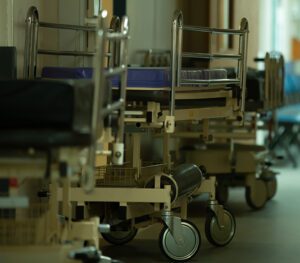 People are having seizures, medical procedures and nursing care in corridors, storerooms and even toilets in UK hospitals due to lack of government investment and reforms to the NHS and social care, a new report by the Royal College of Nursing (RCN) has revealed.
People are having seizures, medical procedures and nursing care in corridors, storerooms and even toilets in UK hospitals due to lack of government investment and reforms to the NHS and social care, a new report by the Royal College of Nursing (RCN) has revealed.
The ‘On the frontline of the UK’s corridor care crisis’ report, published on 16 January 2025, featured 5,408 responses from nursing staff working in UK NHS hospitals from 18 December to 11 January 2025.
Nearly two-thirds of responders said they had to care for patients in places not designated for patient care on a daily basis. More than 90% of responders said this compromised patient care and safety.
Professor Nicola Ranger, general secretary and chief executive of the RCN, said: “Nursing staff trying to care for patients in corridors, storerooms, carparks, offices and even toilets. No access to safety critical facilities like oxygen, suction or monitoring equipment. Fire escapes blocked. Patients having diagnoses and discussions in public, and being treated, fed, washed and toileted – and sadly even dying – with no privacy.
“Staff across health and social care at breaking point as professionals and as people, knowing they cannot give patients and families the care and dignity they deserve.
“Most shocking is this situation now being accepted as the norm.”
“A patient fell off a bed with a seizure”
Examples of people having seizures in waiting rooms and corridors were reported across many regions covered by the report, including London, the North West, West Midlands, Northern Ireland and Scotland.
A nurse from the South East Region said: “I have had patients there [in the corridor] who were in excruciating pain, having alcohol withdrawal seizures, and epileptic seizures.
“I hate delivering care there because I cannot take care of them the way I desperately want to.”
A nurse from the Eastern Region reported that there had been “cardiac arrest and seizures being dealt with in waiting rooms and floors because there aren’t beds!”
In Scotland, a nurse said they had witnessed care in unsafe situations, adding that “a patient actually fell off a bed with a seizure and hurt himself pretty bad.”
The accounts shared by the report describe patient safety, dignity and confidentiality being compromised by these conditions. Responders also reported that staff were left overstretched and with burnout, with some reporting that they are in the process of leaving.
Many said the situation is “heart-breaking”, “embarrassing”, “stressful” and “soul destroying” and is leaving them unable to deliver the level of care they want to.
Ranger said: “The ask of our members and a growing number of concerned organisations, is for [the] government and the NHS to be open and honest about the conditions for patients. Publishing regular data is the minimum needed, not just to track progress, but also to focus minds on the true state of the NHS and social care.”
She called this a “generational moment” requiring “bold government action”.
“Investment in our workforce is vital to deliver the reforms needed to recover patient care, otherwise the future of the NHS, already broken, becomes truly bleak.”

“Simply unacceptable”
Alison Fuller, director of health improvement and influencing at Epilepsy Action and registered nurse, added: “The results of this report are extremely distressing. It’s simply unacceptable that patients should have to be attended to in places where they can’t receive not just the optimum level of care, but even the basic level required.
“When someone has a seizure, one of the most important aspects to keep them safe is to remove, where possible, anything that could cause harm. It’s clear this becomes a major problem in a busy environment, where facilities are lacking, and staff are overstretched and burnt-out. Not to mention the sense of confusion and disorientation, and other symptoms patients can feel following a seizure, which cannot be appropriately managed at that time.
“Patients coming into hospital are already in a vulnerable situation. With a strained and understaffed workforce, it becomes even harder to monitor them correctly and care for them at the level they need and deserve, as well as to protect their dignity.
“We fully back, and strongly add our voice to, calls to fix the workforce and infrastructure of our health system. Now.”
Have you been affected by the corridor care crisis? Let us know your experiences at campaigns@epilepsy.org.uk
More articles



